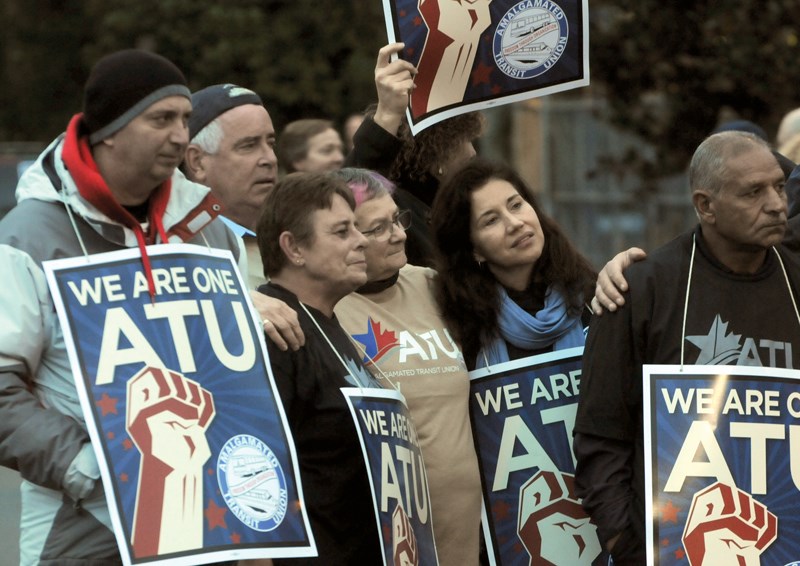Buses in West Vancouver were back on the roads Tuesday morning, following a one-day strike on Monday that left 18,000 regular Blue Bus riders scrambling for other ways to get to their destinations.
The union representing West Vancouver’s bus drivers and mechanics announced buses would be back on the roads after the two sides in the contract dispute reached a tentative deal Monday evening. Picket lines at West Vancouver’s bus depot came down Monday night.
No details were available about the deal, although sticking points in the talks over the past two months have centred on benefits for union workers.
“It came to a satisfactory ending for both parties,” said Geoff Devlin, president of the Amalgamated Transit Union Local 134. Devlin said he is recommending that union members accept the deal. That ratification vote is expected on Thursday.
Bus service in West Vancouver ground to a halt Monday as unionized bus drivers staged a full-scale strike. The sudden stop in service Monday morning left many would-be passengers stranded.
Nanaimo resident Karen Dibblee was heading home from participating in a half-marathon in Vancouver Monday morning and was caught off-guard by the strike. She took a cab from Park Royal to the Horseshoe Bay ferry terminal at a cost of $32.
Both taxi cabs and private shuttle buses offering to take passengers downtown for a premium price did a brisk trade at the ferry terminal Monday.
Beth Stewart, a 79-year-old resident of the Kiwanis assisted living home in West Vancouver, said the Blue Bus strike Monday meant she had to cancel a hearing test because she couldn’t figure out how to get to her appointment. “I live here on my own. I don’t have lots of help,” she said. “I depend on that Blue Bus for my life.”
The tentative deal was reached Monday after West Vancouver Mayor Michael Smith intervened directly and called a meeting between senior district managers and union executive members, setting the stage for direct negotiations that began Monday afternoon without a mediator.
“I’ve been around the block enough to know you can’t get anything settled if you’re not talking,” said Smith. “I felt there’s no point letting the strike go on for a few days before we meet to discuss it.”
Smith said after bus service was halted Monday, he called the union president and said, ‘I’d like to see the talks resume this afternoon. I’d like to get this thing resolved.’”
Smith said the deal involved compromise by both sides. “Both parties had to make concessions and move off their original position in order to get a deal.”
Devlin said the deal was reached after “the district came to their senses. ... It came to a satisfactory ending for both parties.”
Smith said members of the public expressed relief Tuesday morning that the buses were back on the road. “I dropped off my dry cleaning and my dry cleaner was almost in tears with relief he was able to get to work this morning.”
That was in contrast to the frustration being aired during the work stoppage on Monday. “It’s all well and good if you have your own car and you’re not directly impacted,” he said. “But 18,000 people need the service.”
The District of West Vancouver operates the local Blue Bus system under contract to TransLink, as part of a historical agreement between the parties. Busses in other parts of the Lower Mainland are operated by the Coast Mountain Bus Co.
The strike Monday was the first time bus drivers have walked off the job in the Blue Bus service’s 100-year history.



